Astonishing stopping performance, again and again and again.

In fact, each one of our carbon ceramic brake disc weighs just 55% of the weight of the much smaller factory cast iron ones.

Durability
Carbon ceramic brake discs are nothing if not durable. They’re designed to last for the car’s entire lifetime, unlike conventional steel brakes. They last so well because the rotor construction interweaves continuous carbon fibre to form a 3D multi-directional matrix. This makes the material incredibly hard, especially compared to iron discs, which are comparatively malleable making wear an inevitability.

Daily Usability
In fact, just as with high performance steel discs, that’s all down to the pad choice. Due to the different frictional and thermal properties of ceramic discs we include a pad compound that has been specifically developed for these carbon ceramic discs which gives excellent cold responses. This broad temperature operating range makes it the perfect brake set up for those who use their car both as a daily driver and as a track day weapon.

Heat Dissipation
Disc brakes use friction to convert kinetic energy into heat energy. This energy needs to be dispersed if the system is to avoid overheating, and carbon ceramic brake discs perform this job especially well. This characteristic prevents the brake disc from becoming deformed under demanding braking, and helps to keep the vehicle as a whole cool too.

Choosing carbon ceramic brakes is not about the power of a single stop – our Stage 3 big brake kit will perform that task just as well.
Corrosion Resistance
If you live in a cold and icy area, you’re probably already aware that salted roads can pose a huge risk to the metal components of your vehicle – brake discs included. Carbon ceramic brakes, on the other hand, are virtually immune to corrosion. This is because the material they’re made from is much less reactive than steel and iron, due to the material’s tightly bonded structure.
Finally, carbon ceramic brakes are much cleaner and quieter than conventional steel brakes. Standard brakes produce that sticky black brake dust that we all hate cleaning from our wheels, and gradually impede the brakes' functioning. Your carbon ceramic brakes just produce a fine, light-coloured dust which doesn’t stick around to interfere with your braking power.
You can find the Carbon Ceramic brake kit here

